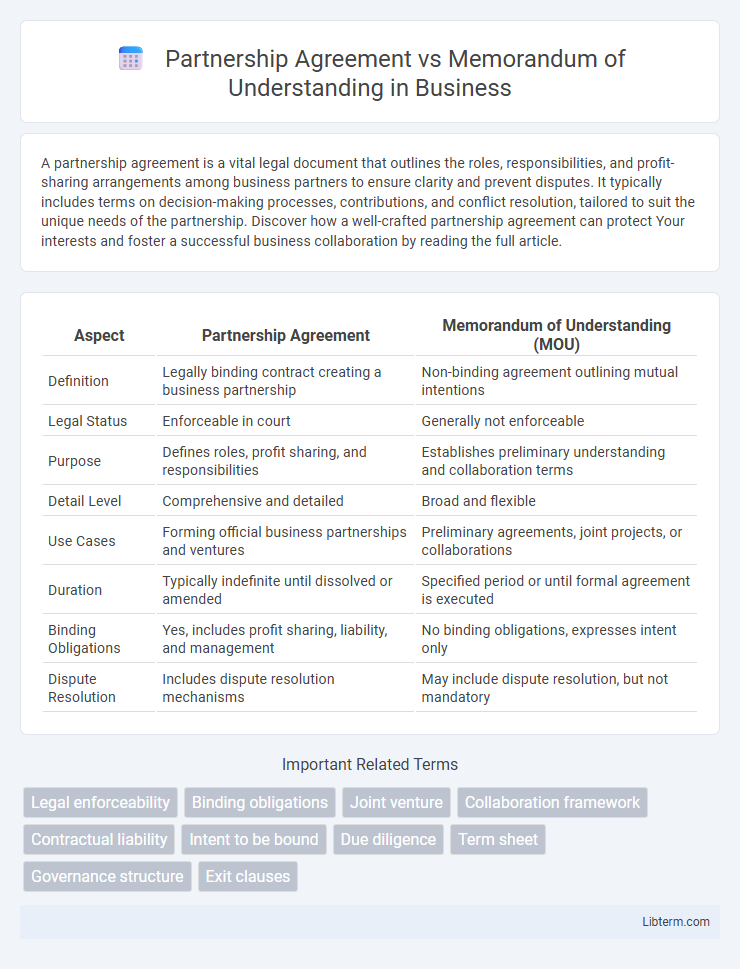A partnership agreement is a vital legal document that outlines the roles, responsibilities, and profit-sharing arrangements among business partners to ensure clarity and prevent disputes. It typically includes terms on decision-making processes, contributions, and conflict resolution, tailored to suit the unique needs of the partnership. Discover how a well-crafted partnership agreement can protect Your interests and foster a successful business collaboration by reading the full article.
Table of Comparison
| Aspect | Partnership Agreement | Memorandum of Understanding (MOU) |
|---|---|---|
| Definition | Legally binding contract creating a business partnership | Non-binding agreement outlining mutual intentions |
| Legal Status | Enforceable in court | Generally not enforceable |
| Purpose | Defines roles, profit sharing, and responsibilities | Establishes preliminary understanding and collaboration terms |
| Detail Level | Comprehensive and detailed | Broad and flexible |
| Use Cases | Forming official business partnerships and ventures | Preliminary agreements, joint projects, or collaborations |
| Duration | Typically indefinite until dissolved or amended | Specified period or until formal agreement is executed |
| Binding Obligations | Yes, includes profit sharing, liability, and management | No binding obligations, expresses intent only |
| Dispute Resolution | Includes dispute resolution mechanisms | May include dispute resolution, but not mandatory |
Introduction: Partnership Agreement vs Memorandum of Understanding
A Partnership Agreement is a legally binding contract that outlines the roles, responsibilities, profit-sharing, and liability among business partners. A Memorandum of Understanding (MoU) serves as a non-binding document expressing mutual intentions and preliminary terms before formal agreements are finalized. While a Partnership Agreement establishes enforceable obligations, an MoU primarily facilitates preliminary collaboration and clarifies expectations without legal commitment.
Definitions: What is a Partnership Agreement?
A Partnership Agreement is a legally binding contract between two or more parties outlining the terms, responsibilities, profit-sharing, and management structure of a business partnership. This agreement establishes clear roles, contributions, and dispute resolution mechanisms to ensure smooth operation and protect all partners' interests. Unlike informal arrangements, a Partnership Agreement provides enforceable rights and obligations under applicable business laws.
Definitions: What is a Memorandum of Understanding?
A Memorandum of Understanding (MOU) is a formal but non-binding agreement outlining the terms and details of a mutual understanding or cooperation between parties. It defines the roles, responsibilities, and intentions without creating legal obligations, often serving as a precursor to a more detailed Partnership Agreement. MOUs are typically used to establish clear communication and expectations during the initial stages of collaboration.
Legal Binding Nature: Key Differences
A Partnership Agreement is a legally binding contract that outlines the rights, responsibilities, and obligations of each partner, enforceable in a court of law. A Memorandum of Understanding (MOU), while demonstrating mutual intent, is generally not legally binding and serves as a preliminary agreement to define terms before formal contracts are made. The key difference lies in the enforceability, where Partnership Agreements establish legal accountability, whereas MOUs typically lack such binding power.
Purpose and Scope of Each Document
A Partnership Agreement defines the formal and legally binding terms, roles, responsibilities, profit sharing, and dispute resolution mechanisms between business partners, establishing a clear framework for ongoing collaboration and operational governance. A Memorandum of Understanding (MOU) outlines a non-binding agreement that sets preliminary intentions, general objectives, and the scope of cooperation without detailed legal obligations, often serving as a precursor to a more detailed contract. The Partnership Agreement has a narrower, enforceable scope focused on business operations, while an MOU covers broader intentions and mutual understanding between parties.
Essential Components: Partnership Agreement
A Partnership Agreement includes essential components such as the nature and purpose of the partnership, capital contributions by each partner, profit and loss distribution, roles and responsibilities, decision-making processes, dispute resolution mechanisms, and terms for dissolution. It legally binds partners by clearly defining financial obligations, liability, and operational guidelines to avoid future conflicts. Detailed provisions on governance and exit strategies ensure stability and clarity throughout the business relationship.
Essential Components: Memorandum of Understanding
A Memorandum of Understanding (MOU) outlines the essential components such as the purpose of the agreement, roles and responsibilities of each party, and the scope of collaboration without creating legally binding obligations. Key elements include clear definitions of objectives, terms of cooperation, confidentiality clauses, and dispute resolution procedures. MOUs often serve as a preliminary framework to guide further negotiations before formalizing a Partnership Agreement.
Usage Scenarios: When to Use Each
A Partnership Agreement is ideal for formal business relationships where legal obligations, profit sharing, and operational roles are clearly defined, especially in joint ventures or long-term collaborations. A Memorandum of Understanding (MoU) suits preliminary negotiations or non-binding agreements outlining mutual intentions without legal enforceability, often used in exploratory partnerships or multi-party collaborations. Selecting between these depends on the need for legal commitment versus a framework for cooperation and understanding.
Advantages and Disadvantages Comparison
A Partnership Agreement provides a legally binding framework that clearly defines roles, responsibilities, profit sharing, and dispute resolution, offering strong protection and clarity for all parties involved; however, it requires formal execution and can be time-consuming and costly to establish. A Memorandum of Understanding (MOU) offers flexibility and ease of drafting, facilitating collaboration and mutual understanding without legal obligations, but lacks enforceability and may lead to ambiguity or conflicts if expectations are not clearly managed. Choosing between these documents depends on the need for legal enforceability versus informal cooperation, with Partnership Agreements suited for long-term, committed relationships and MOUs ideal for preliminary or exploratory negotiations.
Choosing the Right Document for Your Needs
A Partnership Agreement legally binds parties to defined roles, responsibilities, profit sharing, and dispute resolution, offering enforceable terms essential for formal business ventures. A Memorandum of Understanding (MOU) serves as a non-binding outline of mutual intentions and preliminary agreements, ideal for early-stage collaborations or when parties seek clarity without legal obligations. Selecting the appropriate document hinges on the desired level of commitment and legal enforceability, with Partnership Agreements suitable for long-term, structured partnerships and MOUs preferred for flexible, exploratory arrangements.
Partnership Agreement Infographic

 libterm.com
libterm.com